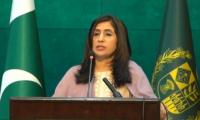ISLAMABAD: The Supreme Court has observed that elected representatives are answerable both to voters and party and they must follow the party line while voting through a secret ballot.
It also observed: “If one does not follow the party, its dishonesty and breach of trust.” The court has also questioned the presidential reference seeking its opinion on holding Senate elections though an open ballot and observed that being a political matter; the government should have approached the Parliament for making an amendment to the Constitution instead of moving the court.
A five-member bench of the apex court headed by Chief Justice of Pakistan Gulzar Ahmed and comprising Justice Mushir Alam, Justice Umar Ata Bandial, Justice Yahya Afridi and Justice Ijazul Ahsan resumed the hearing on the presidential reference.
Continuing his arguments, Attorney-General Khalid Javed submitted before the court Wednesday that that they had approached the apex court to interpret Article 226 of the Constitution, adding that the instant reference would promote transparency and accountability in the electoral process.
Justice Yahya Afridi questioned the filing of the presidential reference in the apex court. “In the instant reference, you talk about morality and law while seeking Senate elections through an open ballot and seek our opinion”, Justice Yahya Afridi told the AG. “Why we should give you opinion when the issue is political in nature,” he said, adding that the government should have approached the Parliament formaking amendment to the Constitution instead of moving the court.
The AG contended that the apex court had considered many political matters and said he could give lots of examples wherein the court interpreted the Constitution. Khalid Javed quoted a reference filed in 1973 (PLD 1973 SC 563) wherein the question with regard to adoption of a resolution by the National Assembly for recognition of Bangladesh was considered by the Supreme Court in the absence of the parties and opinion was rendered that such a resolution may be moved in the assembly. “Whether disqualification of politicians by the apex court in the dual citizenship case was not a political matter,” the AG asked. Similarly, he contended that the matter pertaining to disclosing of assets by politicians in the nomination papers for contesting the elections was political in nature but the court interpreted the relevant law.
Justice Yahya Afridi endorsed the arguments pertaining to the reference filed in 1973 regarding recognition of Bangladesh to which the attorney-general said if it was true there, it was also true here.
“So you want us to interpret Article 226 of the Constitution”, Justice Ijazul Ahsen told the AG. Yes, the AG replied that they had approached the apex court, seeking its opinion on holding the Senate elections through an open ballot. Khalid Javed submitted that they have approached the apex court to interpret Article 226 of the Constitution. The AG claimed that the government had field the instant reference for promoting transparency and accountability in the electoral process, acknowledge respect for the choice of citizen voters.
The reference had claimed that holding the elections through an open ballot would strengthen political parties and their discipline which was essential for parliamentary democracy and discouraging floor crossing, using of laundered money for vote buying in elections, which grossly insults the mandate of people. The AG submitted if the opinion of the apex court came in favour of the instant reference, the final decision would be taken by the Parliament. He read out Article 225 of the Constitution that related to elections dispute and submitted that no election to the National Assembly or Provincial Assembly shall be called in question except by an election petition presented to such a tribunal and in such manner.
At the outset of the hearing, Justice Ijazul Ahsen observed that elected representatives were answerable both to the voters as well as to the party which awarded them the ticket to contest the elections. “If one sells his or her vote, he or she resorts to breaching the trust of both his or her voters as well as the party he or she represents”, Justice Ahsen observed, adding that it will be dishonesty while exercising his or her right to vote through a secret ballot against the party discipline. If he or she wants to exercise his or her vote in a free manner, he or she should show the courage and stand up and say to whom he or she wants to give vote and then face the consequence.
The attorney-general submitted that those contesting elections on party tickets were required to adhere to discipline. Justice Umar Ata Bandial observed that every MPA was bound to obey the party discipline and exercise his orher right to vote as per the party direction.
The attorney-general submitted that the elections of prime minister, chairman and deputy chairman Senate and chief ministers were not clear in the Election Act 2017 as well as in the Election Commission of Pakistan. He, however, submitted that the process of election of chairman and deputy chairman Senate was available under Article 60 of the Constitution.
Justice Ijazul Ahsen observed that in Article 53 and 60 of the Constitution, nothing had been mentioned on whether the Senate elections would be conducted either through a secret or open ballot.
The AG contended that it was clearly mentioned in the Constitution that the outgoing speaker would conduct the process of electing the speaker of the National Assembly, adding that the preliminary business of the elected house was to elect its speaker.
Justice Ijazul Ahsen observed that as per Article 226, all elections other than that of the prime minister and the chief ministers were conducted through a secret ballot. Chief Justice Gulzar Ahmed observed that the elections to the National Assembly and the Provincial Assemblies are held under the Constitution.
The court adjourned the hearing for today (Thursday). Earlier, in pursuance of the court order, the government of Balochistan filed its synopsis and endorsed the presidential reference. It prayed to the apex court to answer the reference in the affirmative and hold that the federal government as well as the parliament is empowered to undertake requisite amendments to the Election Act 2017 and introduce voting through an open ballot in the Senate elections.
Kasuri urged authorities of Pakistan and China to pull their resources to defeat forces seeking to disrupt the...
IHC said that several people had not returned the cipher copies they had, and asked if it meant it was right for the...
Gilani gave floor to Leader of Opposition Syed Shibli Faraz, who insisted that with unity they could take country...
Match witnessed intense action and dramatic twists, keeping fans on the edge of their seats until the final ball
Apex court bench was reconstituted after Justice Yahya Afridi recused himself from hearing the case earlier this month
ECP issued a notification in this connection pursuant to orders passed by LHC







